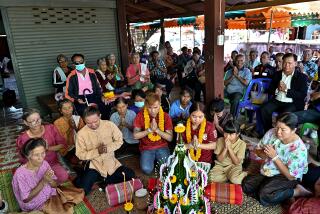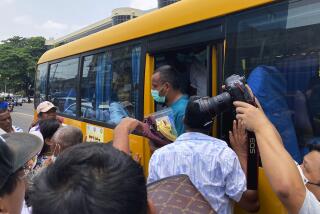Activists Tell of Treatment in Myanmar
BANGKOK, Thailand — The 18 human rights activists deported from Myanmar were greeted Saturday with garlands of yellow jasmine and pink roses on their arrival here, where they were welcomed by about 200 cheering supporters. They gave starkly different accounts of their treatment by the authorities who detained them.
One American activist said the six U.S. citizens were treated like royalty, but a Thai activist said his group was treated harshly in the first four days of detention in police headquarters before all 18 were united at a state guest house.
The activists--six Americans, three Thais, three Malaysians, three Indonesians, two Filipinos and an Australian--were picked up by police in Yangon a week ago after distributing thousands of pro-democracy leaflets.
“We were treated like kings and queens,” Sapna Chatpan, one of six U.S. activists, said as she arrived at the VIP lounge at the airport here. “We were kept in police headquarters with fans, air conditioning, food and anything we could possibly want.”
Sawat Uppahad, a Thai businessman, said he and his two countrymen had to sleep on the dirty floor of an almost bare room.
“There were rats running about our room and we were watched 24 hours a day by police,” he said. “There was no running water, nothing to read, no books, and they wouldn’t give me a newspaper.”
In a one-day trial Friday, a judge convicted the activists of violating an Emergency Provisions Act dating from 1950. They were sentenced to five years of hard labor, but within minutes officials announced that the sentences were suspended and they would be deported.
None of the activists, 10 men and eight women, said they had plans to return to Myanmar.
Opposition leader Aung San Suu Kyi, winner of the 1991 Nobel Peace Prize, meanwhile, remained parked at a roadblock 19 miles west of Yangon, the capital, for a fourth day. Authorities do not want her to meet supporters of her party outside Yangon.
Myanmar’s military regime has accused her and the foreign activists of trying to destabilize the state.
More to Read
Sign up for Essential California
The most important California stories and recommendations in your inbox every morning.
You may occasionally receive promotional content from the Los Angeles Times.










